Private Eye Surgery in Exeter
Specialised Private Eye Surgery in Exeter
Welcome to our cutting-edge ZEISS Cataract Suite, the epitome of advanced eye care nestled in the heart of Exeter. At the forefront of innovation in the UK, we are dedicated to eradicating cataracts and providing meticulous care using state-of-the-art technology. Our highly skilled surgeons ensure precise intraocular lens (IOL) implantation, promising efficient outcomes for our esteemed patients.
The Medical Eye Clinic extends its expertise beyond cataracts, offering comprehensive treatment for various ocular conditions such as glaucoma and age-related macular degeneration. From initial consultation to post-procedure care, our unwavering commitment ensures a service of unparalleled quality, addressing every aspect of your ocular health.
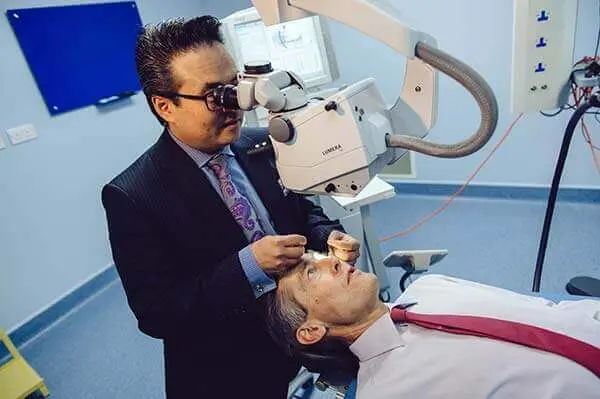
The Medical Eye Clinic Offers Expert Private Eye Surgery in Exeter
Clear vision is essential for overall well-being, enriching our perception of the vibrant world around us. Understanding its paramount importance, The Medical Eye Clinic Exeter is dedicated to elevating eye care standards in Devon.
Our esteemed team of ophthalmologists and optometrists, in partnership with Bill Opticians, delivers exceptional and innovative eye care services.
Whether you seek expert-led treatments, advanced eye examinations, or premium eyewear solutions, our comprehensive approach ensures personalised care under one roof. Our use of cutting-edge technology guarantees precise diagnostics and tailored procedures for optimal outcomes.
Our Eye Surgeries at The Medical Eye Clinic Exeter
our advanced ZEISS Cataract Suite, a premier facility dedicated to the effective treatment and elimination of cataracts. Our team of highly skilled surgeons possesses the expertise to perform intraocular lens (IOL) implantation seamlessly and accurately, utilising cutting-edge technology for optimal results.
In addition to our specialisation in cataract surgery, we are well-equipped to address a wide range of eye conditions, including glaucoma and age-related macular degeneration. From your initial consultation to the successful completion of your procedure, we are committed to providing you with a comprehensive and exceptional service that surpasses expectations in terms of thoroughness. Our unwavering dedication is cantered around delivering personalised care and ensuring your utmost satisfaction throughout your entire journey.
We perform:
- Cataracts
- Diabetic Macular Oedema
- Glaucoma
- Wet Macular Degeneration
- Refractive Errors
Cataracts: Private Eye Surgery in Exeter
Private cataract surgery has emerged as an increasingly popular and highly successful solution for individuals struggling with the debilitating effects of cataracts. This condition presents itself as a cloudy appearance of the lens in the eye, severely limiting one’s ability to see clearly. Many patients in Devon are now choosing private cataract surgery due to its numerous advantages.
Cataracts, a common eye condition, cause the lens to become cloudy, significantly impacting visual acuity. Under normal circumstances, this transparent disc located within the eye ensures sharp vision. However, the presence of cataracts distorts how one perceives their surroundings.
Over time, these cloudy formations can expand, potentially leading to complete loss of vision. While cataracts typically affect both eyes, it is possible for them to develop in only one eye or for one eye to have a higher prevalence. The underlying cause of cataract formation lies in the deterioration of lens tissues, resulting in the formation of protein clusters that obstruct specific areas of the lens.
Cataract treatment
At present, medical science has yet to uncover any breakthroughs that can effectively hinder or prevent the advancement of cataracts. Nevertheless, a viable solution exists for those who aspire to enhance their eyesight: the replacement of the clouded natural lens with an artificial intraocular lens. By opting for this procedure, individuals can not only achieve a significant improvement in their vision but also experience a remarkable enhancement in their overall quality of life.
Cataract private eye surgery enjoys widespread recognition as one of the most frequently performed, safest, and most successful surgical interventions worldwide. During the surgical procedure, highly proficient medical professionals gently extract the cloudy natural lens and create a small incision at the periphery of the eye to facilitate the insertion of the artificial intraocular lens. Interestingly, this incision typically heals on its own without requiring stitches, ensuring a swift and uncomplicated recovery. Typically lasting between 15 and 30 minutes, the entire process is pain-free for patients, thanks to the administration of anaesthesia.
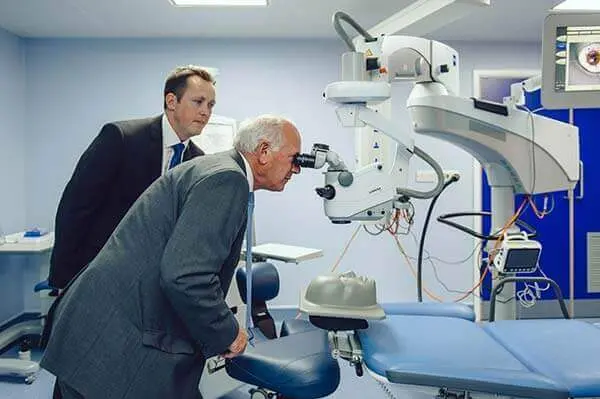
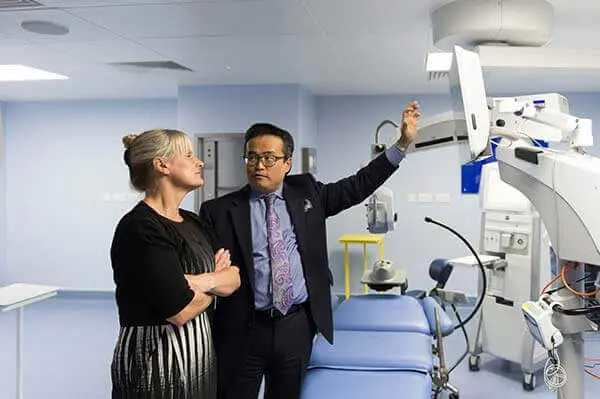
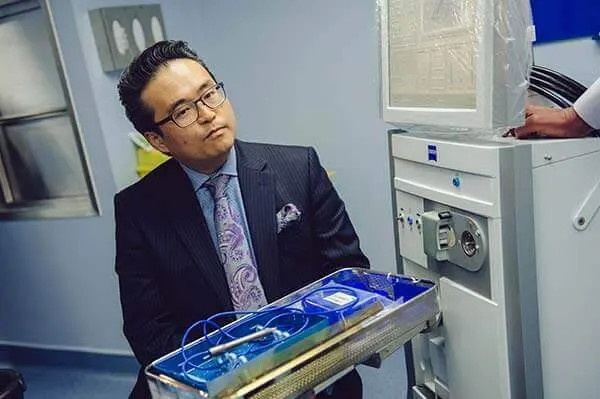
Diabetic-Macular Oedema Private Eye Surgery in Exeter
What is diabetic macular?
The retina assumes a crucial role, much like a shield gently enveloping the rear of your eye. Within this intricate network of cells lies the very essence of our faculty of vision. An area of particular significance is the macula, a sanctuary teeming with vibrant hues and intricate intricacies. Nonetheless, diabetes has the potential to unleash havoc within the fragile capillaries, including those that grace the esteemed macula.
In the relentless face of diabetic affliction, these capillaries gradually weaken, faltering in their duty as they permit the escape of fluid and protein. Alas, this profound act of betrayal exacts its toll, causing the macula to swell and bear the burden of excessive moisture. Consequently, this condition is aptly named diabetic macular oedema (DMO).
What treatments are available for DMO?
As DMO is effectively the manifestation of diabetes in the eye, the treatment for DMO includes optimising the following system risk factors:
- Improve the control of diabetes.
- Improve the control of blood pressure.
- Improve the control of the ‘lipid profile’
In addition to these systemic measures, the following ‘eye-specific’ treatments can be used to treat DMO:
- Laser treatment. This is the conventional treatment for DMO, useful for treating DMO that does not directly involve the central vision. However, when DMO is very close to or involves the very centre of the macula, laser treatment can have the undesirable effect of producing scarring in the central vision.
- Pharmacological treatment by intravitreal therapy This is when medication is injected into the main eye cavity, the vitreous, to treat DMO. This is the modern treatment that is preferable in most cases of DMO, especially when DMO is very close to or involves the central vision.
Glaucoma Private Eye Surgery in Exeter
What is glaucoma?
Glaucoma encompasses a range of eye conditions that are characterised by an increase in pressure inside the eye. This heightened intraocular pressure (IOP) can lead to damage to the optic nerve and a gradual decline in peripheral vision. Treatment for glaucoma varies depending on the specific type of condition one has.
What is truly concerning about glaucoma is its subtle nature, often presenting without any noticeable pain or vision abnormalities. Unfortunately, this means that individuals may remain unaware of the issue until a significant amount of peripheral vision is irreversibly lost.
At the esteemed Medical Eye Clinic, we take pride in our reputation as a leading facility housing a team of highly skilled ophthalmologists and optometrists who specialise in providing comprehensive treatment for glaucoma.
Glaucoma Treatment
To effectively manage glaucoma, a lifelong commitment is essential. This entails regular check-ups and continuous treatment. At our esteemed Medical Eye Clinic in Exeter, we provide an extensive selection of specialised treatments that have been meticulously designed to effectively lower intraocular pressure (IOP), which is the main approach for managing this condition.
Our dedicated glaucoma consultant will work closely with you, customising a personalised treatment plan that caters to your unique needs.
Glaucoma Eye Drops
Throughout history, glaucoma eye drops have played a vital role in treatment, producing remarkable results. The key to success lies in their consistent use, often requiring a daily routine. However, for some individuals, the daily ritual of applying eye drops can be discomforting, and certain medical conditions may make them inappropriate for glaucoma care.
Luckily, at the Medical Eye Clinic, patients are offered a variety of alternative treatments alongside eye drops, ensuring a comprehensive and personalised approach to their care.
Selective Laser Trabeculoplasty, or SLT
SLT presents a straightforward and reliable solution that effectively alleviates intraocular pressure for a diverse range of individuals confronting glaucoma. By employing laser technology to skilfully target the eye’s drainage system, the pressure within the eye is significantly reduced. Before the procedure, a few drops of anaesthesia are administered to ensure a painless experience.
It is important to note that driving immediately after the treatment is not advised; however, most individuals can resume driving the following day. In certain cases, there may be a temporary light sensitivity for approximately one week.
To address this sensitivity, treatment with anti-inflammatory drops might be necessary in severe instances. It is worth mentioning that approximately 3% of patients may experience a brief increase in pressure immediately after laser treatment, but this usually normalises shortly after. SLT has demonstrated effectiveness in around 80% of glaucoma cases. While it may take a few weeks to fully observe the treatment’s complete response, the resulting intraocular pressure generally remains stable for several years, eliminating the need for constant administration of eye drops.
Regular appointments will be scheduled, utilising advanced technologies such as OCT, visual field analysis, and IOP measuring to monitor and evaluate the treatment’s outcomes. If necessary, the procedure can be repeated to ensure optimal results. It is vital to remember that optometrists often detect the initial signs of glaucoma during routine eye examinations. We warmly encourage you to contact our Exeter eye clinic to schedule your routine eye exam and address any concerns you may have.
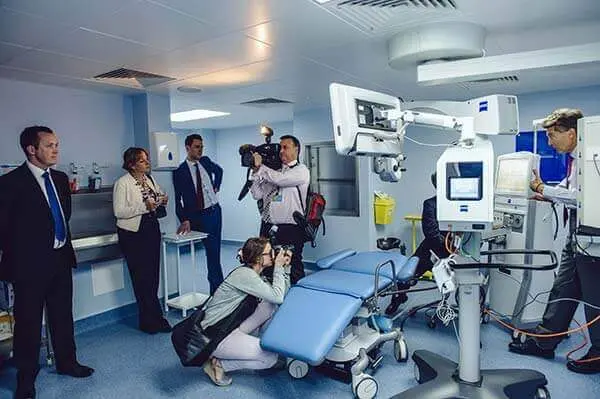
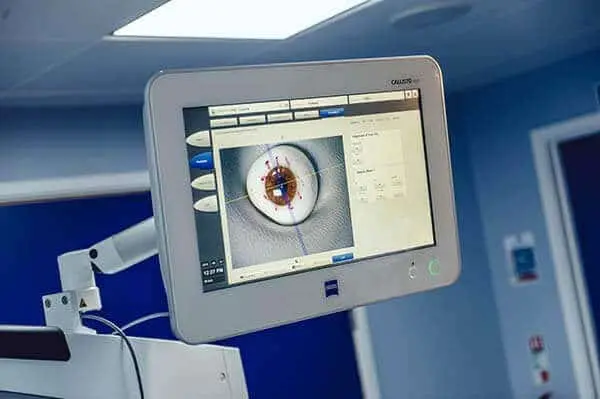
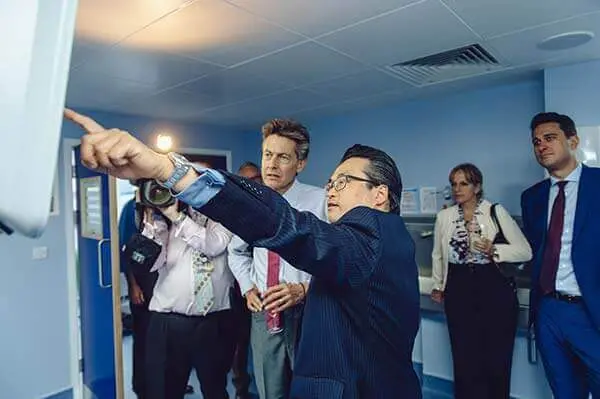
Wet Macular Degeneration Private Eye Surgey in Exeter
What is the Macula?
The retina operates as a delicate membrane, akin to a vulnerable film, softly encasing the rear of the eye. Within this intricate structure, an array of specialised cells collaborates effortlessly to facilitate vision. Notably significant, the macula, a profoundly vital region nestled within the retina, assumes the pivotal task of discerning vibrant hues and intricate details, enabling us to truly appreciate the magnificence of our environment.
What treatment is available?
The emergence of an unconventional network of blood vessels relies heavily on a signalling molecule called Vascular Endothelial Growth Factor (VEGF). This molecule plays a crucial role in the continuous growth and leakage of these vessels.
To tackle this challenge, scientists have developed specialised antibodies known as anti-VEGF agents, which have been humanised for enhanced efficacy. These agents are meticulously designed to specifically target VEGF and impede its impact on the abnormal blood vessel network found in individuals afflicted with wet age-related macular degeneration (AMD).
Consequently, the vessels cease to leak and expand, effectively putting a halt to the progression of wet AMD. To treat wet macular degeneration, a technique called intravitreal therapy (IVT) is employed. This therapy involves the repetitive administration of anti-VEGF agents through injections into the vitreous cavity, the primary hollow space situated at the posterior region of the eye. The primary objective of this process is to desiccate the macula, a critical area adversely affected by wet AMD, and mitigate its deleterious consequences.
Refractive Errors Private Eye Surgery in Exeter
What are refractive errors?
In individuals with a refractive error, the optics of the eye (the cornea and lens) cannot focus light from distant objects on the retina.
Common refractive errors include:
- Myopia: When the optics of the eye are too powerful for the length of the eyeball, one has myopia, or near-sightedness.
- Hyperopia: When the optics of the eye are not powerful enough for the length of the eyeball, one has hyperopia, or farsightedness.
- Astigmatism occurs when the optics of the eye are too powerful or too weak across one meridian. A person with astigmatism sees the lines of a particular orientation less clearly.
- Presbyopia is when the flexibility of the lens declines due to age, leading to difficulty in near vision.
What is refractive lens exchange surgery?
Refractive Lens Exchange (RLE) surgery stands out as an extraordinary surgical procedure that effectively addresses lens-related issues by extracting the natural lens and substituting it with a meticulously crafted artificial lens implant.
This state-of-the-art implant is individually tailored to rectify precise refractive errors, leading to unparalleled visual sharpness at the distance(s) of your preference and seamlessly accommodating your unique lifestyle requirements.
Am I suitable for refractive lens exchange surgery?
Between the ages of 45 and 55, many individuals may observe a decline in their ability to focus on objects at varying distances as a result of changes in the crystalline lens. When faced with this issue, one potential solution to consider is refractive lens exchange surgery. This surgical procedure can prove particularly advantageous for those who already experience significant refractive errors such as myopia, hyperopia, or astigmatism.
Through refractive lens exchange surgery, individuals can experience a substantial enhancement in their overall quality of life by minimising or even eliminating their dependence on glasses or contact lenses. This procedure empowers them to embrace a lifestyle that is no longer constrained by the need for visual aids.

Benefits of Private Eye Surgery in Exeter
Enhanced Treatment Availability
Private healthcare facilities offer a substantial advantage when compared to the often-prolonged waiting times encountered in the National Health Service (NHS). In the NHS, patients frequently encounter extensive periods of six months or even longer before their vital surgical procedures can be scheduled.
In contrast, our esteemed private eye surgery centre, conveniently located in Devon, ensures prompt and efficient treatment, typically within a few weeks following the initial consultation. This ensures patients receive timely and essential care, eradicating any unnecessary delays.
The Significance of Prompt Treatment Access
The significance of immediate access to private eye surgery should never be underestimated, for a multitude of compelling reasons. Foremost among them is the tremendous reduction in waiting time, a critical factor as prolonged delays can aggravate a patient’s deteriorating eyesight, potentially impacting their overall quality of life.
Mundane tasks such as reading, driving, and recognising familiar faces can increasingly become burdensome and tiresome. Consequently, frustration builds up, leading to a heightened reliance on others and a subsequent loss of personal autonomy.
Furthermore, untreated eye conditions can give rise to further complications, including persistent inflammation, glaucoma, or, in severe instances, complete vision loss. Hence, the sooner patients can access treatment, the lower the likelihood of complications arising, and the faster their normal visual capabilities can be restored. Additionally, swift access to treatment alleviates the anxiety and stress associated with waiting for a medical procedure, ultimately contributing to an improved state of mental well-being.
To embark on your journey towards private eye surgery in Devon, we highly encourage you to reach out to our dedicated team today. You have the option to either call our team at 01392 829436 or use our convenient online contact form.
